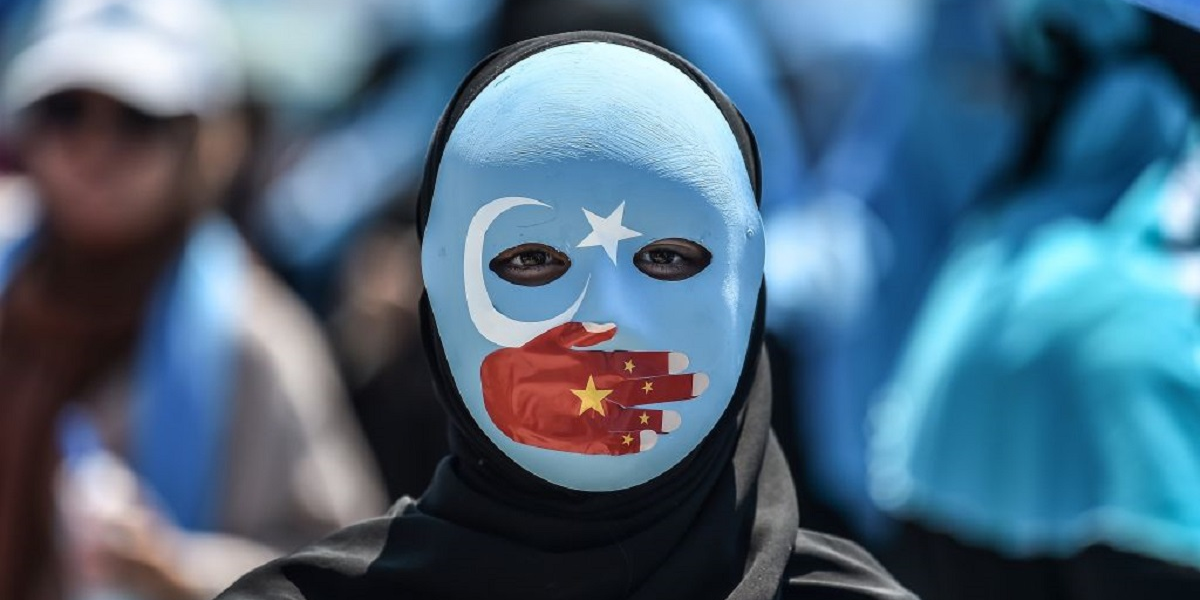- The Chinese government is receiving more and more heat over its persecution of the Uighurs, a majority-Muslim ethnic minority in the country’s west.
- Beijing is responding by trying to stoke Islamophobia in Western countries to justify its controversial policies and even accuse those countries of hypocrisy.
- Earlier this year a Chinese official cited terror attacks perpetrated by Islamic militants in Paris and Belgium to say that Europe was “failing” to curb Islamic extremism.
- China’s critics aren’t buying it.
China is trying to stoke Islamophobia among Europeans to justify, and even export, its model of locking up their Muslim minorities as the troubling crackdown continues to grab global attention.
Beijing is waging an unprecedented crackdown on the Uighurs, a majority-Muslim ethnic minority, in the western region of Xinjiang. Many Uighurs refer to the region as East Turkestan.
Uighurs are placed under intense surveillance in their hometowns, with up to 1 million of them reportedly imprisoned in detention centers or re-education camps, where many are reportedly psychologically and mentally tortured.
Beijing sees its crackdown on Uighurs as a counterterrorism measure, and claimed the camps were “free vocational training” that make life “colorful.”

Lawmakers and international organizations are increasing pressure on China to stop these practices. But Beijing is not only ignoring their critics - it's even trying to get them to follow their lead.
Over the past few weeks, China has, through official statements and editorials in state media, cited Islamic terror attacks in Europe to justify and promote its Xinjiang policy.
China: Maybe Europe should learn from us
Last week the country's state-run Global Times tabloid ran an editorial accusing Europe of hypocrisy in their criticism of China's human rights record.
It even suggested that European countries "discuss with China" how it can learn from Beijing's model of suppressing Muslim minorities.
The writer, Ai Jun, said Europe "may have overlooked its own troubles," and singled out Britain, France, and Germany as countries with large Muslim populations and which were - according to Ai - vulnerable to terrorist and extremist threats.
"Instead of judging China condescendingly, Europe might need to sit down and discuss with China how to figure out their common challenges," Ai said.

In September, Li Xiaojun, a spokesman for China's state council information office, also cited terror attacks in Brussels and Paris carried out by Islamic extremists over the past three years to hit back at Western critics.
Referring to detention centers, Li said according to Reuters: "If you do not say it's the best way, maybe it's the necessary way to deal with Islamic or religious extremism. Because the West has failed in doing so, in dealing with religious Islamic extremism."
"Look at Belgium, look at Paris, look at some other European countries. You have failed."

Peter Irwin, a project manager at the World Uyghur Congress in Munich, told Business Insider: "I think China's tapping into Islamophobia that does certainly exist in the West, but what we're witnessing in China isn't merely Islamophobia. It's the forced assimilation of an entire ethnic group based on historic notions of Chinese superiority."
"China only uses Islamophobic rhetoric retroactively as a means of gaining support from its own domestic population," he added.
Emily Rauhala, The Washington Post's former China correspondent, dismissed the Global Times' criticism of European critics as "Twitter trolling," but warned that its policy of detaining Muslims to counter terror "is the actual position of the Chinese government right now."

It's not working
China's policy of attacking countries that criticized its own human rights issues is not new, and it doesn't seem to be working, either. In fact, Western countries are ramping up their actions against China over the Uighur issue.
This week alone, Reuters reported that 15 Western ambassadors in Beijing were seeking a meeting with Chen Quanguo - the Chinese official believed to have masterminded the Xinjiang crackdown - to demand an explanation over China's Xinjiang crackdown.
On Wednesday, US lawmakers drafted a bipartisan bill urging the White House to punish China, by way of possible export bans and financial sanctions, over its persecution of the Uighurs.
And on Monday, UN experts in Geneva sent a scathing letter to the Chinese government, seen by Business Insider, describing China's Xinjiang policies as "incompatible with China's obligations under international human rights law."
Last month the European Parliament also issued a motion calling on China to "immediately end the mass arbitrary detention" of Uighurs, close all the camps, and allow "free, unhindered access for journalists and international observers to Xinjiang province."

Irwin told Business Insider: "China's consistent refrain in response to allegations of human rights abuses has been to point the finger back at its accusers and remind them that they, too, have their own problems."
"This line of argumentation isn't at all convincing. Although it is true that rights abuses exist the world over, you can't paper over your own record through returned accusations," Irwin added. "If this were the case, all states would accept bad behavior and nothing would change."

